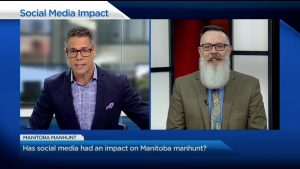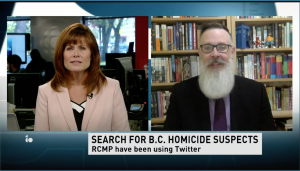As the Mounties continue their search for two murder suspects who have been seen across Canada’s north, a Brandon University professor is finding a lot that’s of interest online.
Dr. Christopher J. Schneider is an expert on police use of social media (in fact, he wrote the book), and he says that the worldwide interest in the Canadian manhunt brings both opportunities and challenges for investigators and for the public.
“The big question is whether social media is overall helping or hurting police, in particular during times of intense exposure such as this manhunt,” he said. “It’s kind of a double-edged sword.”

On the positive side are expanded police abilities to put out timely information and to share images, using social media like a digital wanted poster, he says. On the other hand, social media also allows people to share their own information — or misinformation — both with each other and with the police.
“Many Canadians know what the suspects look like, and are on the lookout for them, and this is good,” Dr. Schneider said. “However, social media can potentially harm police efforts, for example if people disclose the locations of police and alert the suspects.”
In recent days, he has been sharing his insights with national media, including the CBC and Global, as the manhunt continues. Going on national television and radio shows can help get the word out to the public about how their actions affect the police investigation.

For example, posting tips, evidence and other information on social media, or “crowd-sourced policing,” as Schneider has called it, may not be helping matters as much as they hope.
“Police are asking for people to contact them directly, because they can’t always just take tips online. Even videos posted that may have potential evidence, once they’re shared on social media, it becomes much more difficult to verify the chain of custody,” he explains. “Suddenly you have prosecutors who have to go to much longer lengths to prove where this evidence came from, and prove that it wasn’t edited, manipulated or otherwise tainted.”
These concerns slowed efforts to make arrests and to bring charges in the wake of the 2011 Vancouver riots, he noted. He covered the concerns more extensively in a 2012 journal article.
As more public attention and reaction happen online and on social media, police may also need more resources to effectively engage.
“The sheer volume of interaction is growing — police do have staff and resources for social media, but we can surmise that they don’t have all the resources necessary to work through a case like this, with national and international attention.”
Contact
- Brandon University
- communications@brandonu.ca
To receive any BU publication in an alternate format please contact Communications@BrandonU.ca
About BU
Success is built at Brandon University. Our growing, progressive campus welcomes a diverse and inclusive community that combines proud tradition with shared ambition. Through our excellence in teaching, research, and scholarship, we educate students to make a meaningful difference as engaged citizens and leaders. Join us at BrandonU.ca.